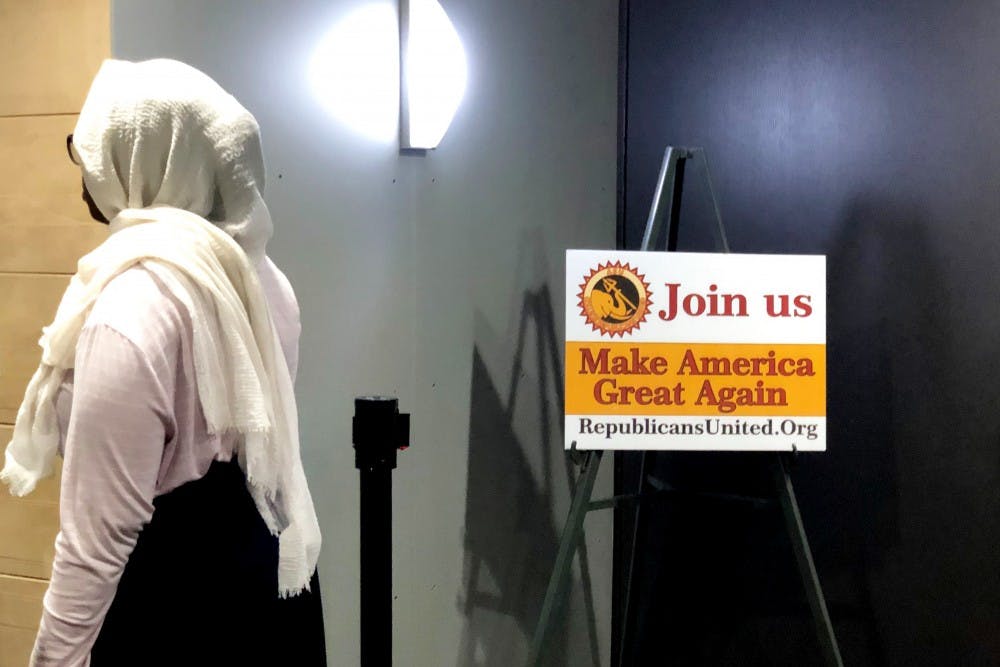College Republicans United held an event called a Conversation with Islam Wednesday on ASU’s Tempe campus, featuring anti-Islam speaker Carl Goldberg and Imam Omar Tawil.
Goldberg has been labeled islamophobic by the Council on American-Islamic Relations for "misrepresenting Islam to wide audiences." He is also a member of the Arizona chapter of ACT for America, which has been designated a hate group by the Southern Poverty Law Center.
Tawil, an imam at the Islamic Community Center of Tempe, was given 20 minutes to address Goldberg’s claims after Goldberg's 20 minutes. Both speakers then answered questions that were submitted by the audience and chosen by CRU and the ASU Muslim Students Association.
CRU first reached out to MSA in August to provide what the club’s email describes as a "counterbalance to refute (Goldberg’s) claims" and to "give our members a second opinion after his presentation."
Aamirah Chisti, the president of MSA and a senior majoring in mathematics, said that although it may be hard to listen to Goldberg speak, the MSA agreed that it was better to send someone to the event than leave Goldberg’s ideas unchallenged.
"I figured they're going through with the event, it's better to provide a speaker that is knowledgeable versus not having anyone at all," Chisti said. "This is one of the rare times that they're going to get this different narrative."
Despite the group’s Eventbrite page calling CRU "a free speech platform open to all civil viewpoints and discourse," The State Press was told in an email from the club’s president that "Press is NOT welcome to attend the event."
About 100 people attended the event. Members of the ASU Police Department and University staff were present to ensure there were no outbursts from the crowd. CRU members walked along the sides of the audience to make sure no one was taking photos or recordings of any kind.
Goldberg began his speech by thanking MSA, and telling the audience that what he says is not his personal opinion, but instead information from "the Islamic sources."
"I want to recognize the courage on the part of MSA to share the stage with a knowledgeable infidel," Goldberg said.
However, Tawil pointed out that Goldberg's lack of knowledge of the languages the original texts were written in means that Goldberg can only work with translations, which inherently hold the biases of the translators.
"If one is to be considered a scholar, they have to access the language," Tawil said. "Translation is interpretation ... there is a difference from one translation to the next."
Tawil also talked about how Goldberg does not have the lived experience of life as a Muslim or any extensive academic knowledge on Islam.
One of Goldberg's main talking points was that Sharia law is very specific and controlling of one's personal life, and its "totalitarian and imperialist ideology" is incomprehensible in the West. In his speech, he referenced a translated version of the 14th-century interpretation of Sharia.
Tawil explained that "Sharia legislates behavior, not identity," and that even among Islam scholars there are "a variety of opinions on how it legislates that behavior." Tawil also warned against "tempocentrism," meaning using today's values to judge a 14th-century interpretation.
Although tensions were high for many people going into the event, the event itself ran smoothly.
"I was really scared coming here today," said Noonii Bilal, a junior majoring in justice studies. "One side is here debating their identity … I never wanted somebody to walk out of here and feel like one part of their identity was being threatened, or that they will lose that part of their identity because of the outcome of this debate."
Chisti said that although she got nothing out of the event, if at least one person learned something new about Islam, then it could be considered a success.
"It was overall a good event, although I don't think we're sure we're going to repeat that," Chisti said afterward. "There's just too much of a risk of things going wrong.”
For Chisti, most of Goldberg's arguments were basic points that she has heard before.
"This is very common knowledge, and it's unfortunate that some people like to misconstrue what Islam says," Chisti said. "The things that Goldberg says ... we’re all too familiar with them, they're the most common anti-Islam arguments."
Members of CRU declined to comment on why the club chose to host Goldberg instead of just inviting an imam to speak, but one member said that it was a "stimulating conversation" and he was glad the two speakers could go back and forth.
The student refused to give his name after making the comment.
Overall, Bilal said that people seemed to be relieved things went smoothly and that the experience could serve as a good teaching moment.
"A lot of people were opposed to it; I'm happy that it happened because fear shouldn't dictate our choices," Bilal said. "It should inspire us to move forward and keep going."
Reach the reporter at krquaran@asu.edu and follow @kiaraquaranta on Twitter.
Like The State Press on Facebook and follow @statepress on Twitter.




